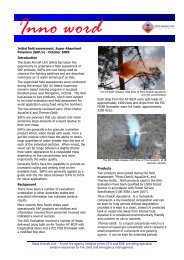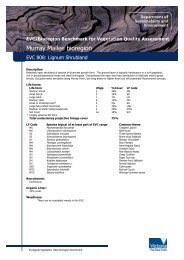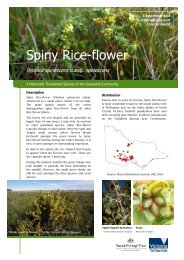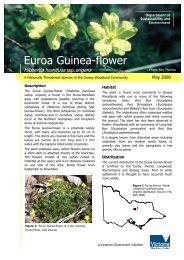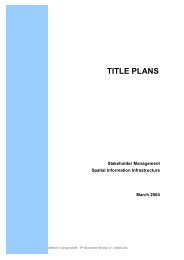Issue 22 Summer 2001 [PDF File - 1.1 MB - Department of ...
Issue 22 Summer 2001 [PDF File - 1.1 MB - Department of ...
Issue 22 Summer 2001 [PDF File - 1.1 MB - Department of ...
You also want an ePaper? Increase the reach of your titles
YUMPU automatically turns print PDFs into web optimized ePapers that Google loves.
GROUP<br />
SAVES<br />
local creek<br />
By Joan Brookshaw<br />
The Sandy Creek Catchment Landcare<br />
Group is an active set <strong>of</strong> volunteers from<br />
Welshmans Reef near Maldon. Recently<br />
one <strong>of</strong> the group members raised the<br />
problem <strong>of</strong> blackberry infestation along<br />
a section <strong>of</strong> a local road. The group did<br />
an inspection and discovered blackberries<br />
up to two metres high that were impeding<br />
the flow <strong>of</strong> a small creek.<br />
The job was too big for the group on its<br />
own so we contacted the North Central<br />
CMA to see what could be done. After<br />
a few more discussions and inspections<br />
a grant <strong>of</strong> $14,500 was made available<br />
to rehabilitate the site.<br />
The NCCMA sent in a machine called<br />
a groomer which removed the blackberry<br />
infestation. Sandy Creek Catchment<br />
Landcare Group will now plant trees<br />
and grasses along the creek banks.<br />
The site is a nice place to visit as it is<br />
not far from the historic town <strong>of</strong> Maldon<br />
and there are some old ruins nearby.<br />
The project has been a great success<br />
and we encourage other groups to<br />
contact their local authorities when<br />
they see a worthwhile project.<br />
Above: The creek near Barham Road flows<br />
once again after the removal <strong>of</strong> a blackberry<br />
infestation.<br />
Victorian Landcare and Catchment Management Page 10<br />
FarmBis helps sustain<br />
The new FarmBis<br />
The new FarmBis program which<br />
commenced in July, will provide about<br />
$6 million <strong>of</strong> grants each year for the<br />
next three years in Victoria to subsidise<br />
training for farmers, land managers and<br />
wild-catch fishers to improve their selfreliance<br />
and ability to manage change.<br />
The program is jointly funded by the<br />
Commonwealth and State Governments.<br />
Natural resource management training<br />
is a priority <strong>of</strong> the new FarmBis.<br />
Courses pay <strong>of</strong>f for Korumburra<br />
dairy farmer<br />
Jon Christopher is a dairy farmer in<br />
the lush green hills near Korumburra in<br />
south Gippsland. His farming system and<br />
production were impacted on significantly<br />
after attending the FarmBis-subsidised<br />
Healthy Farming Systems course.<br />
“FarmBis made the course so cheap,<br />
that to me you’d be an idiot if you<br />
didn’t take it up. For the $500 it cost<br />
me, if you look at in purely commercial<br />
terms, the return on that investment<br />
would be a hundred-fold.<br />
“I’m getting in the high 40 cents a litre<br />
for my milk now and that will be all year<br />
round, not just part <strong>of</strong> the year. Doing that<br />
course has dramatically spring-boarded<br />
us into organic production,” said Jon.<br />
Chemical cold turkey<br />
“We followed the conventional line for<br />
the first three years we were here but it<br />
just wasn’t making any sense. The soils<br />
to me were going backwards. Pasture<br />
species and pasture density were failing<br />
and worm numbers were disappearing.<br />
So in 1994 we went cold turkey and<br />
stopped using chemicals, because it<br />
seemed the right way to go.”<br />
The Healthy Farming Systems course<br />
that Jon Christopher attended is the first<br />
course <strong>of</strong> its kind in Australia. It develops<br />
an understanding <strong>of</strong> the Albrecht<br />
principles <strong>of</strong> balancing soil minerals.<br />
The course provides good basic knowledge<br />
and gives farmers the confidence and<br />
knowhow to work from there.<br />
Jon said there were more conventional<br />
farmers doing the course than those who<br />
were already organic.<br />
“It was a very popular course. I think<br />
one reason for the good response is that<br />
a lot <strong>of</strong> farmers are questioning the use<br />
<strong>of</strong> chemicals. A lot <strong>of</strong> farmers are more<br />
organic than they realise, but because<br />
organics has been seen as the fringe<br />
and alternative, it’s not been accepted.<br />
Now I think we’re moving from the<br />
pioneering stage to the commercial stage.”<br />
Brushing up on business skills<br />
While Jon was focusing his energies on<br />
various issues on the farm over the last<br />
few years, he realised that a lot <strong>of</strong> his<br />
other skills were disappearing and felt<br />
he needed to improve some business<br />
management skills in bookwork,<br />
business planning and computers.<br />
“I’ve used FarmBis to brush my business<br />
skills up too. I did the Dairy Business<br />
Focus course, so I could plan the business<br />
better and see where I was headed. Before<br />
I did the Healthy Farming Systems course,<br />
I did the Phosphate for Dairy Farmers<br />
course to keep an open mind – that was<br />
also FarmBis-funded. I’ve also completed<br />
Cashbooks and the GST using FarmBis<br />
funding.<br />
“I think what most farmers don’t realise<br />
is that they are managers <strong>of</strong> a whole<br />
lot <strong>of</strong> different systems. I think they<br />
underestimate the skills they have got.


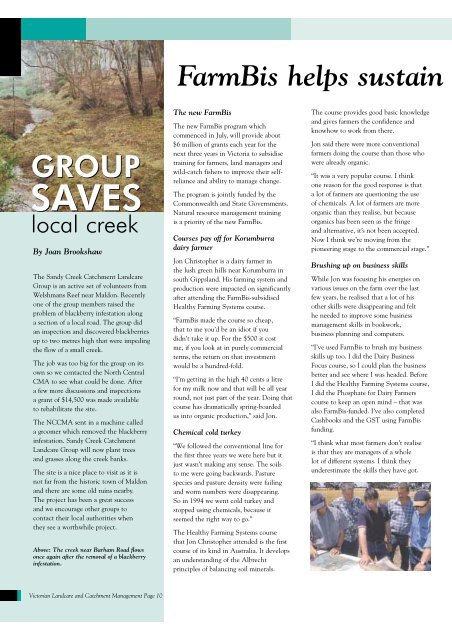
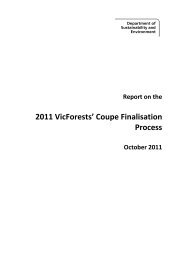
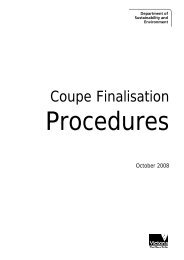
![Metcalfe State Forest Fauna Species List [PDF File - 16.9 KB]](https://img.yumpu.com/22024301/1/184x260/metcalfe-state-forest-fauna-species-list-pdf-file-169-kb.jpg?quality=85)
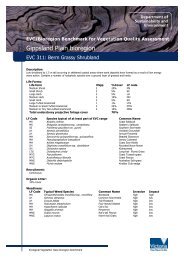
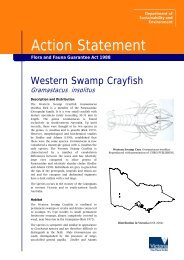
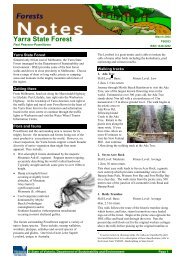
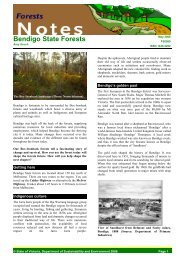
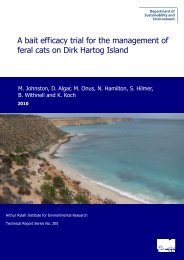
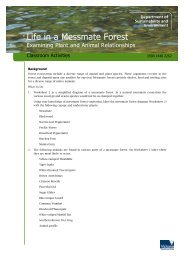
![PPE Price List for Wildlife Volunteers [PDF File - 20.3 KB]](https://img.yumpu.com/15321634/1/190x135/ppe-price-list-for-wildlife-volunteers-pdf-file-203-kb.jpg?quality=85)
